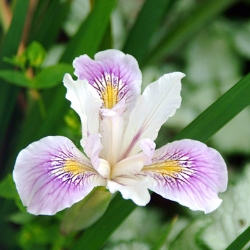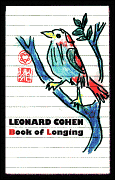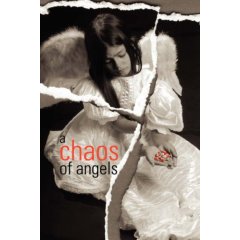
|
Jim Doss is co-editor of Loch Raven Review. He was born and
raised in the foothills of the Blue Ridge
Mountains. He has lived most of his life in the mid-Atlantic region with
the exception of several years in Arizona. His work has appeared in
Poetry East, Words-Myth, Poems Niedergasse, and other publications. A
graduate of the University of Virginia, he earns his living as a
software engineer, and lives with his wife and three children in
Maryland.
Leonard Cohen is a cultural icon in his native Canada and much of the world. He began his career in the 1950's as a poet with books such as Let Us Compare Mythologies and Flowers for Hitler. In the early to mid 1960's he produced the acclaimed novels Beautiful Losers and The Favorite Game. In the late 1960's he recorded his first album of original songs, and has since largely devoted himself to music, while producing an occasional volume of poems. Lois P. Jones has been published in The California Quarterly, The American Tanka Society, Prairie Poetry, Loch Raven Review and The Los Andes News. Her poetry was part of a thesis performance at the Art Institute of Chicago. She co-hosts a monthly reading at Moonday in Pacific Palisades, California with Alice Pero. Alice Pero is a New Yorker who became a left coaster in 1996. Her book Thawed Stars is available on amazon.com. She has taught creative writing to children for over 15 years. |
Spring 2007 Table of Contents - Vol. III, No. 1 |
|
|
Poetry Translations Interview Essays Fiction Book Notes & Reviews |
|
|
Leonard Cohen,
The Book of Longing,
Harper Collins, ISBN 978-0-06-112558-4, 229 pages, 2006, $24.95. Die-hard Leonard Cohen fans are used to waiting years for his next CD of songs or book of poetry. The Book of Longing is Cohen’s first book of poetry since 1993’s Stranger Music, and like Stranger Music it is made up of poems, song lyrics, prose and something new: original Cohen drawings. I initially became acquainted with the work of Leonard Cohen in the early 1970’s through his first books of poetry published in the ‘50’s and ‘60’s, his two novels, and only later grew to know him through his music. At that time, three things struck me about this writer: 1) his morose, sometimes self-deprecating narcissism, 2) his ability to make the erotic seem holy, and 3) his occasional sardonic social commentary. Needless to say, I looked forward to his new book with great anticipation. The Book of Longing brings together a hodgepodge of Cohen poems from the 1970’s through 2005. The book is dedicated to Irving Layton, fellow Canadian poet and Cohen’s mentor, and displays the typical Cohen Beautiful Loser attitude:
Layton’s Question The Book of Longing has the intimate feel of a poet’s working notebook or journal. Not every poem in the book is profound or polished to the n-th degree. Some of the most interesting poems offer a glimpse of Cohen’s life as a monk on Mt. Baldy, a lifestyle which seems so contrary to his nature:
The Lovesick Monk Or:
His Master’s Voice Or from the poem Leaving Mt. Baldy:
I came down from the mountain The tension between spiritual matters and physical longings, between the desires of youth and the memories of old age gives this book much of its energy and propel it along:
As much as there is to like about this highly personal portrait of Cohen, there are a few annoyances: 1) too many throw-away poems that shouldn't have made the cut, 2) the self-portraits of the sad-faced artist lamenting his fate as well as drawings of nude women are overdone and, in the Zen-sense, less would have been more, and 3) the book has a rushed feel to it— the quality of many of the drawings, the layout and blurry back cover photograph of the artist could have been done better. Whether Cohen will produce another book of poetry in his lifetime remains to be seen, but with The Book of Longing he adds another chapter to his legacy, his unique artistic vision, which can be described as:
I followed the course Cohen’s fans, who make up a cult-like following, will rave about this book. In truth it is a book of good poetry, but not great poetry. However, that being said, this is vintage Cohen aging gracefully and poetically so it is worth the investment and the read. Additional samples from the book can be found at The Leonard Cohen Files.
a chaos of angels, edited by Lois P. Jones and Alice Pero, Word
Walker Press, ISBN 978-1-84728-673-4, 130 pages, 2006, $18.00. Taking their queue from a tag line used in the 1997 film Gattaca that “there is no gene for The Human Spirit,” editors Lois P. Jones and Alice Pero have assembled an ambitious and heartfelt anthology on the broad topic of chemical driven happiness, the propensity of our society to look for quick-fixes in pills. The book is tastefully laid-out from the front cover to the contributor notes, and the editors have done a skillful job in selecting an interesting and varied mix of poems. This is no easy feat, considering most of these poems deal with the effects of psychiatric drugs on individuals and their loved ones, and the pretensions and mind-sets of those who practice in this field. There is the occasional rant, but given the subject matter the anthology is surprisingly rich, complex and rewarding. One hundred poems written by both well-known and lesser-known poets fill the pages of this book. The background of these poets range from full-time writers to teachers, computer programmers, waiters and psychologists. The styles of the poems run the spectrum from rhymed formal verse to confessional, avant-garde and experimental. A poem by Amanda Crowell Steibel, a teacher, touches upon the human price of over-medication in a very personal and disturbing way: BlackoutThere are two years missing No photos No memories No poetry I had lost my job Lived in a one-room mouse hole And coughed up blood from a month's bronchitis Got so bad I needed help The shrink I paid $150 an hour Asked me 30 minutes of questions About sleeping, money, sex and wine Diagnosed and wrote two 'scripts Severe bipolar Zyprexa Prozac Sleeping pills Life slowed, stopped Glazed over Two years 65 pounds Hours, dollars Thousands later I awoke Doubled over in a week's withdrawal Remembered And wrote And lived And lived Jeanette Clough, with two collections of poetry to her credit, explores healing and rejuvenation: SelfSomething has its fingers around my lungs. Non-breath. Constriction. Also release when I reach into that vacancy. Hearsay of elsewhere- hobbles me. Perhaps I sought to fall freely into the void. Instead I find myself grasped, grasping, adding lengths to my rope. Alas, poor self. Shall I tell stories about you? Tattle & gainsay? Something has cut through. Phlegm rattles in protest then yields to another invasion of air repeatedly. Flighty and casual, this vital exchange: an open poppy, and the same ruffled color. I picture myself shouldering through the soil. My bloom is said in many ways. Laura Freedgood, another teacher and writer, pens a tender poem about letting go of a loved one after a death: For my MotherYou asked for ashes, fearing the heft of dirt, a box where you could not breath. Last year on this date you were gone, a small plastic pouch I hugged to my chest as I walked along the pier until it bucked up against the river, undid the tie and looked: no flecks of bone, no smell of the oven where they sized you down to an urn you didn't want preferring brine and the swoon of seagulls. So I let you go, watched your ashes settle on the waves the drift towards the ship in the next birth, promising to carry you across the Atlantic where it turns aquamarine and exotic, swirling about the city you found irresistible, with its piazzas and palazzos, its Titians and Tintorettos, the sea folding you in its arms, a sign on the salt spray. This sampling of poems demonstrates the diversity and wide range of themes contained within the volume. While ostensibly focused on the pill-dependent society, these poems really are a study of the spiritual potential that exists inside of all humans free of the outside influences of chemicals. In a sense, it is an invitation to turn away from the artificial utopias of Huxley's Brave New World or Vonnegut's Harrison Bergerson. In a world where the pharmaceutical companies regularly encourage TV viewers to lobby their doctors for the latest miracle cure for the slightest ailment, it is refreshing to see a different point of view presented where humans long to be rugged individuals embracing their quirks and idiosyncrasies rather than searching for the chemical compound that brings lasting happiness or the boredom of conformity or the norms of behavior. How many great artists (painters, writers and musicians) of previous ages would be numbed into mediocrity by today's doctors? The pharmaceutical industry has certainly helped those with the most extreme cases of psychiatric problems, but it has gone overboard and to extremes to medicate where other alternatives are more healthy and appropriate. Thanks to Jones and Pero for raising these issues in the form of an artistic discussion that all serious artists should participate in. Now it is up to us to set the chaos of angels inside ourselves free for the betterment of the world.
© Jim Doss |
|
|
Poetry Translations Interview Essays Fiction Book Notes & Reviews |

